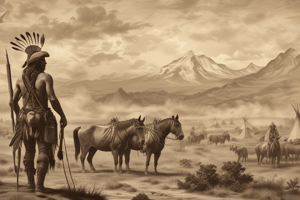Podcast
Questions and Answers
How did westward expansion impact Native Americans?
How did westward expansion impact Native Americans?
- They assimilated without conflict.
- They prospered economically.
- They were forced to move to reservations. (correct)
- They were given more land.
Why did settlers feel justified in taking Native Americans' land?
Why did settlers feel justified in taking Native Americans' land?
They believed they were making the land more productive.
What are reservations?
What are reservations?
Small pieces of government land set aside for Native Americans.
Native Americans were forced to move to reservations due to treaties.
Native Americans were forced to move to reservations due to treaties.
What happened when the government broke treaties?
What happened when the government broke treaties?
What was the impact of the killing of the buffalo on Native Americans?
What was the impact of the killing of the buffalo on Native Americans?
What does forced assimilation mean?
What does forced assimilation mean?
What does assimilation mean in the context of Native Americans?
What does assimilation mean in the context of Native Americans?
What was the Dawes Act?
What was the Dawes Act?
What was the missionaries' attempt related to Native Americans?
What was the missionaries' attempt related to Native Americans?
What was the purpose of Indian boarding schools?
What was the purpose of Indian boarding schools?
When did Native Americans become considered U.S. citizens?
When did Native Americans become considered U.S. citizens?
How did Native Americans respond to westward settlement?
How did Native Americans respond to westward settlement?
What happened at the Battle of Little Bighorn?
What happened at the Battle of Little Bighorn?
What are the Sioux also called?
What are the Sioux also called?
Where is the Sioux reservation located?
Where is the Sioux reservation located?
What happened at the Massacre at Wounded Knee?
What happened at the Massacre at Wounded Knee?
What was the last major episode of violence in Native American wars?
What was the last major episode of violence in Native American wars?
Who was Chief Joseph?
Who was Chief Joseph?
What did the Apache believe?
What did the Apache believe?
When did the Apache surrender?
When did the Apache surrender?
What is a synonym of Apache?
What is a synonym of Apache?
Flashcards are hidden until you start studying
Study Notes
Impact of Westward Expansion on Native Americans
- Native Americans were forcibly relocated to reservations due to treaties and government policies.
- Assimilation efforts aimed to transform Native Americans into settled farmers, impacting their traditional lifestyles.
- The mass hunting of buffalo by Americans disrupted Native American economic and cultural practices.
Justification for Land Seizure
- Settlers believed their actions made the land more productive, rationalizing the appropriation of Native American territories.
Reservations
- Reservations are designated lands set aside by the government for Native Americans, often characterized by limited resources and poor living conditions.
Treaty Violations
- The U.S. government frequently broke treaties, further encroaching on Native American lands and rights.
Cultural Assimilation
- Forced assimilation sought to erase Native American cultures and integrate them into Euro-American society.
Dawes Act
- The Dawes Act reallocated reservation land into 160-acre plots for individual Native American families, promoting farming for profit.
Missionary Efforts
- Missionaries attempted to convert Native Americans to Christianity, often undermining existing belief systems.
Indian Boarding Schools
- Native American children were sent to boarding schools to learn skills like carpentry and housekeeping, aimed at erasing their cultural identities.
Citizenship
- Native Americans were granted U.S. citizenship in 1924, marking a significant, albeit delayed, recognition of their rights.
Native American Resistance
- Many Native Americans viewed westward settlers as invaders and made heroic efforts to protect their lands and cultures from encroachment.
Battle of Little Bighorn
- Following the discovery of gold on Sioux lands, many Sioux resisted relocation, leading to the defeat of Custer's forces.
Sioux Nation
- The Sioux are also known as the Lakota, with prominent figures like Sitting Bull and Crazy Horse leading their resistance efforts.
Sioux Reservation Location
- The Sioux Reservation is primarily located in South Dakota, encompassing significant historical lands.
Wounded Knee Massacre
- The massacre at Wounded Knee involved the U.S. Army and resulted in the deaths of Sitting Bull and over 300 camp followers, marking one of the last violent confrontations.
Chief Joseph and Nez Perce
- Chief Joseph led the Nez Perce on a strategic retreat toward Canada after being forcibly removed to reservations in Idaho.
Bears Paw Mountain
- Bears Paw Mountain is where Chief Joseph and his followers surrendered to U.S. troops after an extensive pursuit.
Geronimo and the Apache
- Geronimo was a prominent leader of the Apache in the Southwest, known for his resistance against both Mexican and U.S. forces.
Apache Beliefs
- Geronimo believed he had supernatural abilities, including the power to walk without leaving tracks, emblematic of his fierce spirituality and resistance.
Apache Surrender
- Geronimo surrendered to U.S. forces in 1886 in Arizona, symbolizing the broader decline of Apache resistance.
Symbolism of Bravery
- The term "Apache" has become a synonym for bravery, highlighting the fierce resistance of the Apache people throughout their conflict with American settlers.
Studying That Suits You
Use AI to generate personalized quizzes and flashcards to suit your learning preferences.




